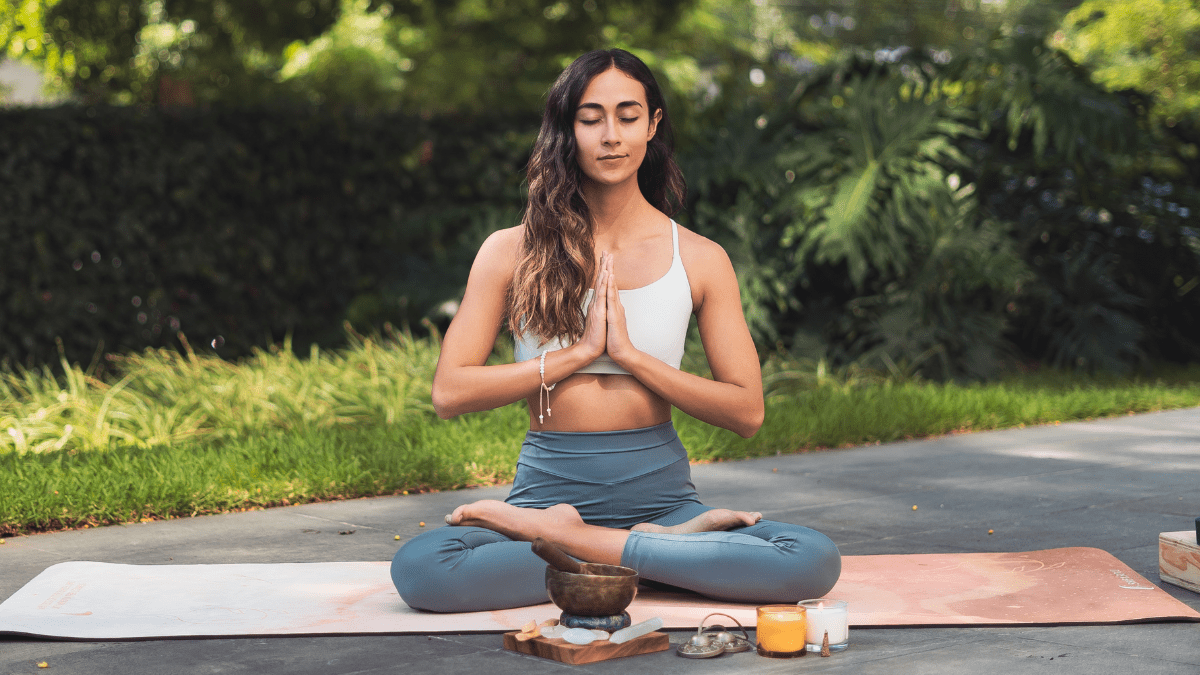Meditation for Deep Sleep: Unlock True Rest Now
Meditation for deep sleep rewires your restless mind, silences anxiety, and unlocks deep healing. Discover the powerful sleep method that changes everything—starting tonight.

In This Article
- What Is Meditation for Deep Sleep and Why Does It Work?
- Why Meditation for Deep Sleep Actually Works
- Best Meditation for Deep Sleep Techniques That Calm the Mind
- How to Build a Nightly Meditation for Deep Sleep Routine
- The Science Behind Meditation and Sleep Quality
- Real People Using Meditation for Deep Sleep Successfully
- Conclusion — Reclaim True Rest Through Meditation for Deep Sleep
- Meditation for Deep Sleep — FAQ
What Is Meditation for Deep Sleep and Why Does It Work?
Sleep should be simple. But for many, it feels impossible. If your nights are restless and your thoughts never stop, you’re not alone. Stress, anxiety, and screen overload are stealing rest from millions. That’s why meditation for deep sleep is changing lives. It goes beyond relaxation, it rewires your nervous system. It calms the mind, slows the breath, and invites deep rest—naturally.
Unlike sleeping pills, meditation doesn’t force your body to shut down. Instead, it invites your system to soften, shift, and settle. It works with your body, not against it.
In this guide, you’ll discover how meditation helps you fall asleep faster, stay asleep longer, and wake up truly refreshed. You’ll explore the science, the methods, and the stories behind this life-changing practice.
You’ll also find out how practices like Yoga Nidra for deep sleep can unlock peace in just minutes.
So, if you’re ready to break the cycle of sleepless nights, keep reading. Real rest is closer than you think.
Why Meditation for Deep Sleep Actually Works
What happens in your brain during sleep meditation?
When you start meditating, your brain shifts. It slows from beta (thinking) to alpha and then into deeper theta waves. These brainwaves signal rest and recovery.
As your breath deepens, your nervous system responds. The parasympathetic state kicks in. This is your “rest and digest” mode. According to Headspace, this shift lowers cortisol and heart rate, easing you into deep sleep.
So, you’re not just relaxing. You’re biologically preparing to rest.
Is it different from regular meditation?
Yes, and here’s why. While mindfulness meditation focuses on awareness, meditation for deep sleep is about surrender. It guides you out of mental chatter and into physical stillness.
Techniques often use soothing imagery, slow breathing, or body scanning. These tools help your system release the day’s stress. Over time, they train your body to recognize safety and softness at night.
According to Verywell Mind, specific sleep meditations increase melatonin levels and reduce nighttime awakenings. It’s a different goal—and a different outcome.
Can meditation replace sleep medication safely?
For many people, the answer is yes. Though sleep aids can offer short-term relief, they come with risks—dependence, fog, and poor sleep quality.
Meditation, however, works with your brain’s natural rhythms. It doesn’t force unconsciousness. It invites real rest.
As Healthline notes, people who meditate regularly report fewer sleep disturbances, deeper REM cycles, and brighter mornings. Plus, it’s free—and it heals, not masks.
So if you’re looking for lasting sleep, meditation is a safer, smarter choice.
Best Meditation for Deep Sleep Techniques That Calm the Mind
What are the most effective types of sleep meditation?
Some methods work better at bedtime. While mindfulness is powerful, certain techniques are built for deep rest. According to Mindful.org, body scans, Yoga Nidra, and guided imagery are ideal for sleep.
Body scans help relax your muscles one part at a time. Yoga Nidra takes you to the edge of sleep while keeping awareness gently awake. And guided imagery gives your mind a peaceful focus—like floating clouds or ocean waves.
Each of these helps your nervous system downshift. With practice, your body will begin to associate them with sleep.
How can breathing techniques prepare your body for sleep?
Breath is your brain’s remote control. Slow, conscious breathing tells your body it’s time to rest. When your breath slows, so does your heart rate. That drop signals your body to relax.
Verywell Mind explains that techniques like box breathing or 4-7-8 breathing reduce stress instantly. These methods activate the vagus nerve, lowering anxiety and promoting calm.
Even just five minutes of slow breathing before bed can shift your state. It’s simple—but powerful.
Do mantras or affirmations help during meditation for deep sleep?
Yes, and more than you might think. Repeating calming words or phrases helps anchor your awareness. It quiets racing thoughts and gives the mind something safe to rest on.
Whether it’s “I am safe,” or “I am letting go,” these affirmations set the tone. Healthline notes that mantras can reduce cognitive arousal and help transition into sleep.
Over time, your brain begins to associate these words with stillness and surrender. They become signals for sleep.

How to Build a Nightly Meditation for Deep Sleep Routine
When is the best time to meditate before bed?
Timing can change everything. Meditating too early may lose its impact. Too late, and your body might already be in sleep mode.
The sweet spot is 15 to 30 minutes before sleep. This window allows your mind to slow down without rushing. According to Sleep Foundation, winding down before bed increases your chance of entering deep sleep faster.
Consistency also matters. Even five minutes each night, at the same time, builds a habit your brain will recognize.
What if your mind won’t stop racing at night?
It’s a common struggle. You lie down, but your thoughts speed up. Instead of fighting them, try shifting focus.
Guided meditations work well for this. A calming voice helps redirect scattered thoughts. According to Headspace, even brief sessions can interrupt overthinking and invite presence.
Journaling for a few minutes before meditation also helps. Get thoughts out of your head and onto paper. Then, let them go.
The goal isn’t to empty the mind—it’s to change your relationship with it.
How long should meditation for deep sleep last?
It depends on your needs. Beginners can start with 5–10 minutes. That alone can signal the body to relax. More experienced practitioners might enjoy 20–30 minutes of stillness.
Length matters less than consistency. As Healthline shares, regular practice is more effective than long sessions done randomly.
Even better, many apps offer customizable lengths. Find what works, and stick with it.
What matters most is not how long you sit—it’s how regularly you return.
The Science Behind Meditation and Sleep Quality
How does meditation improve REM and deep sleep stages?
Deep sleep is where your body repairs. REM is where your brain processes memory and emotion. Meditation strengthens both.
According to Healthline, regular meditation helps shift brainwave activity. It reduces beta waves (linked to overthinking) and boosts alpha and theta waves. These are essential for falling asleep and staying asleep longer.
Additionally, meditation increases melatonin—a hormone critical for sleep regulation. So, you’re not just relaxing. You’re preparing your brain for true rest.
Can meditation for deep sleep reduce insomnia and sleep disorders?
Yes. It helps in measurable ways. Studies show that people who meditate regularly fall asleep faster and wake less often during the night.
Psychology Today reports that meditation lowers sympathetic nervous system activity. That’s the part responsible for stress and alertness. Instead, it boosts the calming parasympathetic system. This shift helps people with insomnia relax enough to fall asleep naturally.
Meditation also changes how you respond to sleeplessness. Rather than panic, you learn to observe. This alone can break the cycle of chronic insomnia.
What do brain scans reveal about sleep meditation?
The effects are visible. Imaging studies reveal changes in regions tied to emotion and awareness. During meditation, the amygdala—your fear center—shrinks in activity. Meanwhile, the prefrontal cortex becomes more engaged.
Headspace highlights that this shift increases emotional stability. It also reduces nighttime rumination, which often blocks deep sleep.
So, science doesn’t just suggest meditation works—it proves it.
Real People Using Meditation for Deep Sleep Successfully
What results are people seeing with nightly meditation?
The results are powerful. Many report falling asleep faster within days. Others say they wake up feeling more refreshed than they have in years.
According to Headspace, users practicing guided sleep meditations for just 10 minutes a night have seen improvements in both sleep duration and depth. These aren’t rare stories. They’re becoming more common as people turn away from sleep medication.
What matters most? Consistency. Even short, regular sessions lead to real change.
How does meditation for deep sleep help with trauma and anxiety?
Sleep can be hard after trauma. Nightmares, restlessness, or tension in the body make it feel unsafe to relax. But meditation can shift that.
Mindvalley shares that trauma survivors using guided meditations often report fewer nighttime flashbacks and more emotional stability. That’s because meditation helps regulate the nervous system. It also reduces overactive stress responses—common in trauma survivors.
The practice doesn’t erase pain. But it offers peace. One breath at a time.
Can this practice change your life long-term?
Yes. Sleep affects everything. Mood. Focus. Energy. When you sleep better, you live better.
Over time, people using meditation for deep sleep often notice more than just better nights. They feel calmer during the day. More grounded. Less reactive.
Healthline explains that sleep meditation supports emotional resilience, cognitive clarity, and even heart health. It’s not just about rest. It’s about rebuilding your life from the inside out.
So yes—this practice can change everything.
Conclusion — Reclaim True Rest Through Meditation for Deep Sleep
Sleep should restore you. But for many, it only brings frustration. Racing thoughts, tension, and restlessness have become the new normal. Yet it doesn’t have to stay that way.
Meditation for deep sleep offers a simple, powerful path back to peace. It doesn’t rely on pills or quick fixes. Instead, it works with your body’s natural rhythm. Through breath, stillness, and presence, you can train your brain to slow down and rest.
Even better, this practice meets you exactly where you are. Whether you’re healing from stress, trauma, or long-term insomnia, meditation offers tools you can use tonight. And with each breath, you move closer to calm.
Moreover, the benefits go beyond sleep. As your body restores, your mind sharpens. Your emotions soften. Your energy returns. The quality of your sleep shapes the quality of your life.
So, if you’ve tried everything else, try coming back to yourself. A few minutes of quiet can unlock the healing you’ve been missing.
Don’t wait for exhaustion to break you. Start tonight. Dim the lights. Breathe deeply. Let go.
Because real rest isn’t just possible—it’s your birthright.
Meditation for Deep Sleep — FAQ
Can meditation for deep sleep help with insomnia?
Yes. It slows the mind and calms the body. Over time, it helps you fall asleep faster and stay asleep longer. Many find relief within days.
How long should I meditate before bed?
Start with 5 to 10 minutes. That’s enough to feel a shift. Later, you can try longer sessions. But what matters most is doing it regularly.
Do I need guidance or can I meditate on my own?
You can do both. Guided meditations are great for beginners. They give your mind something to follow. Over time, you may prefer silence.







